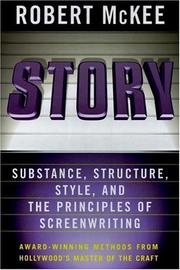Check nearby libraries
Buy this book

For the first time in book form, Robert McKee's Story reveals the award-winning methods of the man universally regarded as the world's premier screenwriting teacher. For more than 17 years, Robert McKee's students have been taking Hollywood's top honors. His Story Structure seminar is the ultimate class for screenwriters and filmmakers, playing to packed auditoriums across the world and boasting more than 35,000 graduates. With Hollywood currently paying record sums for great stories -- and audiences clamoring for originality -- this book is the weapon you need to win the war on clichés and to get your story from page to screen. Unlike other popular approaches to screenwriting, Story is about form, not formula. Employing examples from more than 100 films, McKee imparts a philosophy that reaches beyond rigid rules to identify the more elusive components that distinguish quality stories from the rest of the pack. Beginning with basic definitions (What is a beat? A scene? A scene sequence? An act climax? A film climax?), McKee not only brilliantly unravels the mysteries of standard three-act dramatic structures but also demystifies atypical structures such as two-act, seven-act, and even eight-act films, exposing the limitations of each genre; spotlighting the importance of theme, setting, and atmosphere; and highlighting the importance of character versus characterization. But this book goes well beyond the essential mechanics of screenwriting. From concept through final manuscript, Story elevates writing from an intellectual exercise to an emotional one, transforming the craft of screenwriting into an art form by carefully exploring the subtler considerations at work in film, such as the nature of irony and the symbolic power of image systems. Packed with examples from such film classics as Casablanca and Chinatown, McKee expertly dissects classic scenes, guiding us step-by-step as only he can to reveal not only how a scene works but why it works, getting beyond the fundamentals of composition to the enduring values and conflicts that separate the classics from the clichés. This insightful, practical book has become the gospel for screenwriters everywhere. Hollywood studios don't buy great ideas -- they buy great stories that can capture an audience's imagination. And no one has helped more writers turn great ideas into great stories into great screenplays than Robert McKee. - Jacket flap.
Check nearby libraries
Buy this book

Previews available in: Chinese English
Subjects
Motion picture plays, Technique, Motion picture authorship, Long Now Manual for Civilization, Dian ying wen xue ju ben, Chuang zuo fang fa, Performing arts, Motion picture plays--technique, Pn1996 .m465 1997, 808.2/3, Screenwriting, Screenplays, Social sciences -> radio, television & film -> writing for radio, television & film, Language arts & disciplinesShowing 4 featured editions. View all 17 editions?
| Edition | Availability |
|---|---|
|
1
Story: substance, structure, style and the principles of screenwriting.
2001, China Free Press
in Chinese
710601706X 9787106017064
|
cccc
Libraries near you:
WorldCat
|
|
2
Story: Substance, Structure, Style and The Principles of Screenwriting
December 17, 1997, HarperEntertainment
Hardcover
in English
- 1 edition
0060391685 9780060391683
|
zzzz
Libraries near you:
WorldCat
|
|
3
Story: substance, structure, style and the principles of screenwriting
1997, ReganBooks
Hardcover
in English
- 1st ed.
0060391685 9780060391683
|
aaaa
Libraries near you:
WorldCat
|
| 4 |
eeee
|
Book Details
Table of Contents
Edition Notes
Includes bibliographical references (p. 421-422) and index.
Filmography: p.423-455.
Classifications
The Physical Object
ID Numbers
Source records
Scriblio MARC recordmarc_cca MARC record
Library of Congress MARC record
Ithaca College Library MARC record
Internet Archive item record
marc_openlibraries_sanfranciscopubliclibrary MARC record
Library of Congress MARC record
Internet Archive item record
Better World Books record
ISBNdb
marc_columbia MARC record
Excerpts
Community Reviews (0)
Feedback?| December 20, 2023 | Edited by ImportBot | import existing book |
| December 19, 2023 | Edited by ImportBot | import existing book |
| December 19, 2023 | Edited by ImportBot | import existing book |
| December 12, 2022 | Edited by MARC Bot | import existing book |
| October 25, 2009 | Created by WorkBot | add works page |














